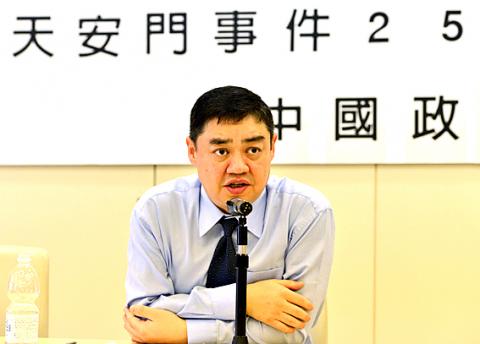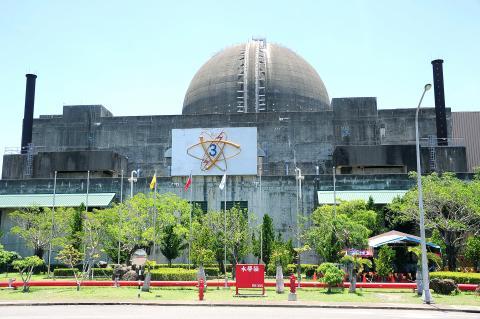Some went missing. Some lost their freedom. Some cannot escape the images inside their head, or the guilt they feel for surviving.
The June 4, 1989, military crackdown to end weeks-long student protests is a key moment in the history of communist-ruled China for the outside world. Within China, it is all but erased. Even personal acts of memory are considered subversive.
While China’s economy, society and cities have transformed in the last 25 years, the demonstrators and their supporters are keen to remind the world that other things have not changed — that China’s political masters are still suppressing dissent and freedom of expression. They call for the Chinese Communist Party to stop hiding what happened on that bloody night, when an untold number of people were killed.

Photo: AFP
Some cling to their democratic fight.
“I am the captain of a sunk ship,” Wuer Kaixi, who was a 21-year-old protest leader, said in a recent interview conducted in English. “I will always question of myself: ‘Why didn’t I die?’ I believe, for the rest of my life... I will try my best to remember the guilt and try to realize the dreams of those who died that night.”
In 1989, as a hunger striker, Wuer rose to prominence when, in hospital clothing, he harangued then-Chinese premier Li Peng (李鵬) during a televised meeting with protesters.
Just over two weeks later he witnessed “the atrocity, the killing” that he still finds difficult to talk about today.
After the crackdown, he escaped. His last glimpse of China was a fading shore from a boat that smuggled him out of the country on a cloudy summer’s night.
Now 46, Wuer has spent longer in exile in the US and in Taiwan than in his homeland, China. He is an investment banker in Taipei, husband to a Taiwanese and father of two sons, aged 19 and 16.
“I still consider myself as a democracy activist, an active dissident. It just unfortunately doesn’t pay, so I have to find another way to support the family,” said Wuer, one of China’s most-wanted student protest leaders, by Internet video phone from his home in Taipei.
He wore a T-shirt emblazoned with “Free LXB” — a reference to activist and Nobel Peace Prize laureate Liu Xiaobo (劉曉波), who is serving an 11-year sentence in China on subversion charges.
Wuer’s most despairing time in the years after 1989 came on the 20th anniversary of the military crackdown.
China had won admiration for the Beijing Olympics the previous year. It was gearing up for its first global fair — the Shanghai Expo — and many were touting it as the economic engine to help pull the world out of the global financial crisis.
“I felt like the world was betraying the idea of democracy ... giving in to China,” he said. “But we the Chinese democracy activists want to carry on our own mission, to finish the unfinished business.”
In the past five years, he has tried four times to go home to see his ailing parents, kneel before them and beg their forgiveness for their suffering — even if he must do it within the walls of a prison.
However, like many other dissidents, he is not only wanted for arrest, but prevented from returning. His parents have been denied permission to visit him.
“Not being able to see the parents, being able to step back on the country that you care so much about, that is painful and that is harsh and unjust,” he said. “But my parents that I haven’t seen so much have also brought me up to be a person who does the right thing. And I know what I have done in 1989 was the right thing, the right thing to do.”
This story was excerpted from a longer article about some of those affected by the Tiananmen Massacre.

A fugitive in a suspected cosmetic surgery fraud case today returned to Taiwan from Canada, after being wanted for six years. Internet celebrity Su Chen-tuan (蘇陳端), known as Lady Nai Nai (貴婦奈奈), and her former boyfriend, plastic surgeon Paul Huang (黃博健), allegedly defrauded clients and friends of about NT$1 billion (US$30.66 million). Su was put on a wanted list in 2019 when she lived in Toronto, Canada, after failing to respond to subpoenas and arrest warrants from the Taipei District Prosecutors’ Office. Su arrived at Taiwan Taoyuan International Airport at 5am today on an EVA Air flight accompanied by a

An essay competition jointly organized by a local writing society and a publisher affiliated with the Chinese Communist Party (CCP) might have contravened the Act Governing Relations Between the People of the Taiwan Area and the Mainland Area (臺灣地區與大陸地區人民關係條例), the Mainland Affairs Council (MAC) said on Thursday. “In this case, the partner organization is clearly an agency under the CCP’s Fujian Provincial Committee,” MAC Deputy Minister and spokesperson Liang Wen-chieh (梁文傑) said at a news briefing in Taipei. “It also involves bringing Taiwanese students to China with all-expenses-paid arrangements to attend award ceremonies and camps,” Liang said. Those two “characteristics” are typically sufficient

A magnitude 5.9 earthquake that struck about 33km off the coast of Hualien City was the "main shock" in a series of quakes in the area, with aftershocks expected over the next three days, the Central Weather Administration (CWA) said yesterday. Prior to the magnitude 5.9 quake shaking most of Taiwan at 6:53pm yesterday, six other earthquakes stronger than a magnitude of 4, starting with a magnitude 5.5 quake at 6:09pm, occurred in the area. CWA Seismological Center Director Wu Chien-fu (吳健富) confirmed that the quakes were all part of the same series and that the magnitude 5.5 temblor was

Restarting the No. 2 reactor at the Ma-anshan Nuclear Power Plant would take up to 18 months, Minister of Economic Affairs J.W. Kuo (郭智輝) said today. Kuo was answering questions during a meeting of the Legislative Yuan’s Economics Committee, where legislators are considering amendments to the Renewable Energy Development Act (再生能源發展條) amid concerns about the consequences of the Pingtung County reactor’s decommissioning scheduled for May 17. Its decommissioning is to mark the end of Taiwan’s nuclear power production. However, Chinese Nationalist Party (KMT) lawmakers have proposed an amendment to the Nuclear Reactor Facilities Regulation Act (核子反應器設施管制法) that would extend the life of existing